Architectural and art movement and style
| This article may contain citations that do not verify the text. Please check for citation inaccuracies. (May 2020) (Learn how and when to remove this message) |
 Nanjing International Youth Cultural Centre, a neo-futuristic skyscraper in Nanjing, China Nanjing International Youth Cultural Centre, a neo-futuristic skyscraper in Nanjing, China | |
| Years active | 1960s–present |
|---|---|
| Location | International |
| Major figures | Peter Cook, Cedric Price, Renzo Piano, Richard Rogers, Norman Foster, Santiago Calatrava, Zaha Hadid |
| Influences | Futurism, high-tech architecture |
| Influenced | Parametricism |
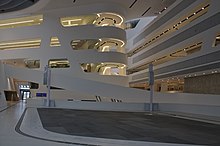
Neo-futurism is a late-20th to early-21st-century movement in the arts, design, and architecture.
Described as an avant-garde movement, as well as a futuristic rethinking of the thought behind aesthetics and functionality of design in growing cities, the movement has its origins in the mid-20th-century structural expressionist work of architects such as Alvar Aalto and Buckminster Fuller.
Futurist architecture began in the 20th century starting with styles such as Art Deco and later with the Googie movement as well as high-tech architecture.
Origins
Beginning in the late 1960s and early 1970s by architects such as Buckminster Fuller and John C. Portman Jr.; architect and industrial designer Eero Saarinen, Archigram, an avant-garde architectural group (Peter Cook, Warren Chalk, Ron Herron, Dennis Crompton, Michael Webb and David Greene, Jan Kaplický and others); it is considered in part an evolution out of high-tech architecture, developing many of the same themes and ideas.
Although it was never built, the Fun Palace (1961), interpreted by architect Cedric Price as a "giant neo-futurist machine", influenced other architects, notably Richard Rogers and Renzo Piano, whose Centre Pompidou extended many of Price's ideas.
Definition
Neo-futurism was in part revitalised in 2007 after the publication of "The Neo-Futuristic City Manifesto" included in the candidature presented to the Bureau International des Expositions (BIE) and written by innovation designer Vito Di Bari (a former executive director at UNESCO), to outline his vision for the city of Milan at the time of the Universal Expo 2015. Di Bari defined his neo-futuristic vision as the "cross-pollination of art, cutting edge technologies and ethical values combined to create a pervasively higher quality of life"; he referenced the Fourth Pillar of Sustainable Development Theory and reported that the name had been inspired by the United Nations report Our Common Future.
Soon after Di Bari's manifesto, a collective in the UK called The Neo-Futurist Collective, launched their own version of the Neo-futurist manifesto, written by Rowena Easton, on the streets of Brighton on 20 February 2008, to mark the 99th anniversary of the publication of the Futurist manifesto by FT Marinetti in 1909. The collective's take on Neo-Futurism was much different to Di Bari's, in a sense that it focussed on acknowledging the legacy of the Italian Futurists as well as criticising our current state of despair over climate change and the financial system. On their introduction to their manifesto, The Neo-Futurist Collective noted: “In an age of mass despair over the state of the planet and the financial system, the futurist legacy of optimism for the power of technology uniting with the imagination of humanity has a powerful resonance for our modern age”. This shows an interpretation of Neo-Futurism that is more socially involved – one that speaks directly to its followers rather than denoting certain outlooks through actions (e.g. choice of eco-aware materials in Neo-Futurist architecture).
Jean-Louis Cohen has defined neo-futurism as a corollary to technology, noting that a large amount of the structures built today are byproducts of new materials and concepts about the function of large-scale constructions in society. Etan J. Ilfeld wrote that in the contemporary neo-futurist aesthetic "the machine becomes an integral element of the creative process itself, and generates the emergence of artistic modes that would have been impossible prior to computer technology." Reyner Banham's definition of "une architecture autre" is a call for an architecture that technologically overcomes all previous architectures but possessing an expressive form, as Banham stated about neo-futuristic "Archigram's Plug-in Computerized City, form does not have to follow function into oblivion."
Matthew Phillips defined the Neo-Futurist aesthetic as a "manipulation of time, space, and subject against a backdrop of technological innovation and domination, posits new approaches to the future contrary to those of past avant-gardes and current technocratic philosophies". This definition agrees with the work of Neo-Futurist architects whose approach is situated in the context of technological innovation, but does not mention the ecological mindfulness that stems from architectural Neo-Futurism.
In art and architecture
Neo-futurism was inspired partly by Futurist architect Antonio Sant'Elia and pioneered from the early 1960s and the late 1970s by Hal Foster, with architects such as William Pereira, Charles Luckman and Henning Larsen.
People
The relaunch of neo-futurism in the 21st century has been creatively inspired by the Pritzker Architecture Prize-winning architect Zaha Hadid and architect Santiago Calatrava.
Neo-futurist architects, designers and artists include people like Denis Laming [fr], Patrick Jouin, Yuima Nakazato, artist Simon Stålenhag and artist Charis Tsevis. Neo-futurism has absorbed some high-tech architectural themes and ideas, incorporating elements of high-tech industry and technology іnto building design: Technology and context has been a focus for some architects such as Buckminster Fuller, Norman Foster, Kenzo Tange, Renzo Piano and Richard Rogers.
Gallery
-
 The Pavilions of Futuroscope in Poitiers by Denis Laming, 1984
The Pavilions of Futuroscope in Poitiers by Denis Laming, 1984
-
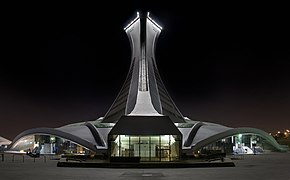 The Tour de Montréal in Montreal by Roger Taillibert, 1987
The Tour de Montréal in Montreal by Roger Taillibert, 1987
-
 L'Hemisfèric in the City of Arts and Sciences, Valencia by Santiago Calatrava, 1998
L'Hemisfèric in the City of Arts and Sciences, Valencia by Santiago Calatrava, 1998
-
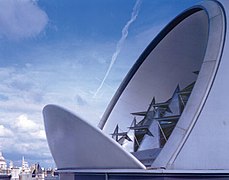 The British Library of Political and Economic Science in London by Norman Foster, 2000
The British Library of Political and Economic Science in London by Norman Foster, 2000
-
 L'Oceanogràfic in the City of Arts and Sciences, Valencia by Félix Candela, 2003
L'Oceanogràfic in the City of Arts and Sciences, Valencia by Félix Candela, 2003
-
 Auditorio de Tenerife in Santa Cruz de Tenerife by Santiago Calatrava, 2003
Auditorio de Tenerife in Santa Cruz de Tenerife by Santiago Calatrava, 2003
-
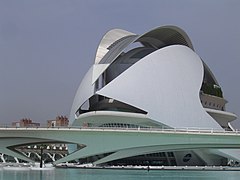 El Palau de les Arts Reina Sofía in the City of Arts and Sciences, Valencia by Santiago Calatrava, 2005
El Palau de les Arts Reina Sofía in the City of Arts and Sciences, Valencia by Santiago Calatrava, 2005
-
The Turning Torso in Malmö by Santiago Calatrava, 2005
-
Hungerburgbahn top station in Innsbruck by Zaha Hadid, 2007
-
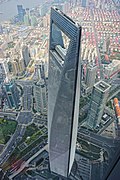 Shanghai World Financial Center by Kohn Pedersen Fox, 2008
Shanghai World Financial Center by Kohn Pedersen Fox, 2008
-
 Liège-Guillemins railway station in Liège by Santiago Calatrava, 2009
Liège-Guillemins railway station in Liège by Santiago Calatrava, 2009
-
 L'Àgora in the City of Arts and Sciences, Valencia by Santiago Calatrava, 2009
L'Àgora in the City of Arts and Sciences, Valencia by Santiago Calatrava, 2009
-
 The Burj Khalifa in Dubai by Adrian Smith, 2010
The Burj Khalifa in Dubai by Adrian Smith, 2010
-
Iceberg Palace in Sochi by Andrey Bokov, 2012
-
 Heydar Aliyev Cultural Center in Baku by Zaha Hadid, 2012
Heydar Aliyev Cultural Center in Baku by Zaha Hadid, 2012
-
 The Shard in London by Renzo Piano, 2012
The Shard in London by Renzo Piano, 2012
-
Jockey Club Innovation Tower in Hong Kong by Zaha Hadid, 2013
-
Pearl River Tower in Guangzhou by Skidmore, Owings & Merrill, 2013
-
 The Evolution Tower in Moscow by RMJM and Philipp Nikandrov, 2014
The Evolution Tower in Moscow by RMJM and Philipp Nikandrov, 2014
-
 Ilham Tower in Kuala Lumpur by Foster + Partners, 2015
Ilham Tower in Kuala Lumpur by Foster + Partners, 2015
-
 Museum of Tomorrow in Rio de Janeiro by Santiago Calatrava, 2015
Museum of Tomorrow in Rio de Janeiro by Santiago Calatrava, 2015
-
 The World Trade Center Hub in New York City by Santiago Calatrava, 2016
The World Trade Center Hub in New York City by Santiago Calatrava, 2016
-
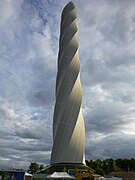 TK Elevator Test Tower in Rottweil by Werner Sobek, 2017
TK Elevator Test Tower in Rottweil by Werner Sobek, 2017
-
 Aerial view of Apple Park in Cupertino by Norman Foster, 2017
Aerial view of Apple Park in Cupertino by Norman Foster, 2017
-
 520 West 28th Street in New York City by Zaha Hadid, 2017
520 West 28th Street in New York City by Zaha Hadid, 2017
-
 Landmark 81 in Ho Chi Minh City by Atkins, 2018
Landmark 81 in Ho Chi Minh City by Atkins, 2018
-
 The Central Library Oodi in Helsinki by Arkkitehtitoimisto ALA, 2018
The Central Library Oodi in Helsinki by Arkkitehtitoimisto ALA, 2018
-
 Exchange 106 Tower in Kuala Lumpur by Mulia Group Malaysia, 2019
Exchange 106 Tower in Kuala Lumpur by Mulia Group Malaysia, 2019
-
 Merdeka 118 in Kuala Lumpur by Fender Katsalidis, 2024
Merdeka 118 in Kuala Lumpur by Fender Katsalidis, 2024
See also
References
- Bethune, Meredith (31 July 2019). "An Inside Look at One of Zaha Hadid's Final Projects: China's Futuristic Jumeirah Nanjing Hotel". Robb Report. Retrieved 20 April 2022.
architect Zaha Hadid, the first woman to win the prestigious Pritzker Architecture Prize, died unexpectedly in 2016. Adding to that tragedy were her many projects left unfinished, including the Nanjing International Youth Cultural Centre (IYCC) in China. Fortunately, her London-based firm Zaha Hadid Architects has carried the torch, making it possible for a new hotel, Jumeirah Nanjing, to open inside the building
- ^ "Neo-futurism". Designing Buildings,the Construction Wiki. 14 May 2021. Retrieved 20 April 2022.
neo-futurist aesthetics 'generates the emergence of artistic modes that would have been impossible prior to computer technology.'
- "Santiago Calatrava's Neo-Futuristic Architecture". Special Travel International. Vancouver. Retrieved 20 April 2022.
Calatrava's artistic sensibility hasn't been limited strictly to architecture. He is also an accomplished sculptor and painter, creating a body of work on a smaller scale
- "Neo-futurism: An Overview for Students in Architecture Training". digitalschool.ca. 14 June 2018.
- Tyc, Grzegorz (2018). "(Re)searching Forms of the Future. Futurism and Contemporary Architecture" (PDF). Krakow. Retrieved 20 April 2022.
The pavilion in the form of a spaceship designed by Zaha Hadid is a perfect place for a futuristic fashion show. Apart from architecture, Zaha Hadid designed fashion, and the catwalk for Chanel.
- Asim, Farhan; Shree, Venu (July–September 2018). "A Century of Futurist Architecture: from Theory to Reality". Journal of Civil Engineering and Environmental Technology. 5 (6): 338–343. ISSN 2349-8404. Retrieved 20 April 2022.
To create a clear distinction between the futurist architecture of 1910–1920 and the architecture of post 1950s, futurism was renamed as 'Neo-futurism' by French Architect Denis Laming
- Mathieu Lehanneur. "Mathieu Lehanneur recommends". TED (conference). Retrieved 22 October 2014.
- Kristi York Wooten (30 March 2015). "How 1980s Atlanta Became the Backdrop for the Future". The Atlantic.
- "John portman News, Videos, Reviews and Gossip – io9". io9.
- "Big dreams and angry protests swirl at abandoned Athens airport". Reuters.com. 26 June 2014. Archived from the original on 8 December 2015. Retrieved 22 October 2014.
- ""Jan Kaplický" Video – Buildings and Interviews". OVGuide. Archived from the original on 9 July 2017. Retrieved 9 May 2015.
- "If Famous Buildings And Paintings Made Babies, They'd Look Like This". Co.Design. 5 September 2014. Retrieved 22 October 2014.
- Christie Chu (14 September 2014). "Imagining the Artist-Architect Collabos That Never Were". artnet News. Retrieved 22 October 2014.
- "Amstel Art Gallery London Archivio Marco Lodola Pop Art Design". Retrieved 22 October 2014.
- "ASIA CONTEMPORARY ART – Amstel Art Gallery". Asiacontemporaryart.com. Archived from the original on 22 October 2014. Retrieved 22 October 2014.
- "In Brief – Fiera Milano News". Fieramilanonews.it. Retrieved 22 October 2014.
- "neo-futurism". designingbuildings.
- Anthony Vidler (2008). "Histories of the immediate present: inventing architectural modernism" (PDF). MIT Press, Massachusetts Institute of Technology. Archived from the original (PDF) on 27 May 2014. Retrieved 22 October 2014.
- Erskine Design. "Frieze Magazine – Archive – The Enclosure Business". frieze. Archived from the original on 22 October 2014. Retrieved 22 October 2014.
- "Vito Di Bari vuelve a Colombia" [Vito Di Bari returns to Colombia]. Computer World Colombia (in Spanish). 3 October 2014. Archived from the original on 17 October 2014. Retrieved 7 November 2014.
- Di Bari, Vito (2014). "Manifesto of Neo-Futuristic City". Helena Pinillos. Archived from the original on 7 November 2014. Retrieved 7 November 2014.
- "From Manifesto to Futurist Architecture". World Architecture. Retrieved 22 October 2014.
- "BIE – Bureau International des Expositions". bie-paris.org.
- "MoreArtCulture Messenger: Vito Di Bari on Wednesday and Your Week in Arts + Culture". constantcontact.com.
- "The economic renaissance led by the Internet of Things". I-cioc.om. Retrieved 22 October 2014.
- "Agreement between UNESCO and the City of Milan concerning the International Multimedia Institute (IMI) – Appointment of Executive Director – UNESCO Archives ICA AtoM catalogue". UNESCO. 8 October 1999. Retrieved 17 January 2014.
- Manifesto of Neo-Futuristic City in www.neofuturistic.com
- "The Concept Of "Sustainable Development" And The Challenges Of Economic Growth And Development In Nigeria". Katsina-Ala Multidisciplinary Journal. Retrieved 22 October 2014.
- World Commission on Environment and Development (2007) . Our Common Future. Oxford: Oxford University Press. p. 27. ISBN 978-0192820808.
- Young, J (2018). Now That's What I Call Neo-Futurism. Rotterdam: Surrealist Taxi BV.
- "The Neo-Futurist Manifesto". Neo-Futurist Collective. 26 October 2014.
- "The Future of Architecture Since 1889". Cool Hunting. Archived from the original on 22 October 2014. Retrieved 22 October 2014.
- "Blume Library Mobile". Library.stmarytx.edu. Retrieved 22 October 2014.
- Ilfeld, Etan Jonathan (2012). Beyond Contemporary Art. Vivays Publishing. ISBN 978-1-908126-22-1.
- Whiteley, Nigel (2002). Reyner Banham: Historian of the Immediate Future. Cambridge: MIT Press. ISBN 978-0262731652.
- Banham, Reyner. "A Clip-on Architecture". Architectural Design. Vol. 35, no. 11.
- Phillips, Matthew (7 August 2020). "The Neofuturist Aesthetic: Technology and counterfuture in the electronic avant-garde". Tiny Mixtapes.
- "Neofuturism Architecture And Technology, SCI-Arc Media Archive". Sma.sciarc.edu. 5 October 1987. Retrieved 17 January 2014.
- Los Angeles Forum for architecture and urban design, Scott Johnson Archived 11 January 2014 at the Wayback Machine
- The Los Angeles Chapter of The American Institute for Architects, Alan Hess, William Pereira: Designing Modern Los Angeles, 2013 Archived 29 November 2014 at the Wayback Machine
- Hugh Pearman (2004). Airports: A Century of Architecture. Laurence King Publishing. ISBN 978-1-85669-356-1.
- "Archived copy" (PDF). Archived from the original (PDF) on 24 June 2016. Retrieved 21 September 2018.
{{cite web}}: CS1 maint: archived copy as title (link) - "Sydney Opera House, Sydney - SkyscraperPage.com". skyscraperpage.com.
- "ឯកសារសំខាន់! ស្វែងយល់ពីស្ថាបត្យករអង់គ្លេសដើមកំណើតអ៉ីរ៉ាក់ លោកស្រី Zaha Hadid (មាន Video Clip)" [Important documents! Discover British-Iraqi Architect Zaha Hadid]. Village of Wonder (in Khmer). Archived from the original on 18 May 2014. Retrieved 22 October 2014.
- "Spotlight: Santiago Calatrava". ArchDaily. Retrieved 22 October 2014.
- ^ "Santiago Calatrava". Mediander. Archived from the original on 30 June 2017. Retrieved 22 October 2014.
- "Denis Laming Architectes". laming.fr. Archived from the original on 22 April 2016. Retrieved 17 March 2015.
- "Denis Laming, L'Architecte du Futuroscope". Sortir à Poitiers (in French). 25 May 2012. Archived from the original on 2 April 2015. Retrieved 17 March 2015.
- Williams, Nicola; Boone, Virginie (2002). The Loire. Lonely Planet. pp. 47–. ISBN 978-1-86450-358-6.
- "King of good times". India Today. Retrieved 22 October 2014.
- "Japanese Fashion Designer Literally Flexes Muscles with 3D Printing". Stratasys Blog. Retrieved 22 October 2014.
- "Yuima Nakazato creates neo-futuristic sportswear with an Objet500 Connex multi-material 3D Printer [7559] – Prototyp". Netcommunity.se. Archived from the original on 17 September 2013. Retrieved 22 October 2014.
- "Swedish seventies neoretrofuturism: the paintings of Simon Stålenhag". Boingboing.net. 21 August 2013. Retrieved 22 October 2014.
- "Neofuturistic Vectors by Charis Tsevis". Fatlace. 15 September 2010. Archived from the original on 7 November 2014. Retrieved 7 November 2014.
- Caridad, Paul. "Neofuturistic Vectors and Vibrant Mosaics". Visual News. Archived from the original on 7 November 2014. Retrieved 7 November 2014.
- "Lord Norman Foster". Encyclopædia Britannica. Retrieved 22 October 2014.
- "My Gallery Space 『・・・・ノ、セカイ』". Geocities.jp. Archived from the original on 5 November 2018. Retrieved 22 October 2014.
Further reading
- Cohen, Jean-Louis (2012). The Future of Architecture. Since 1889. London: Phaidon Press. ISBN 978-0714845982.
- Di Bari V. (2007). "100 years: From Manifesto of futurist architecture to the Neofuturistic city manifesto" (PDF). Retrieved 18 April 2015.
- Foster, Hal (1987). "Neo-Futurism: Architecture and Technology". AA Files. 14 (14). Architectural Association School of Architecture: 25–27. JSTOR 29543561.
- Foster, Hal (1994). "What's Neo about the Neo-Avant-Garde?". October. 70. MIT Press: 5–32. doi:10.2307/779051. JSTOR 779051.
- Rowena Easton, The NeoFuturist Manifesto, 2008 Archived 4 March 2016 at the Wayback Machine
- Klein, Caroline; Lieb, Stefanie (2013). Futuristic: Visions of Future Living. Cologne: DAAB Media. ISBN 978-3942597098.
- A History of Neo-Futurism, Erica Anne Milkovich, 2010 - Avant-garde (Aesthetics)
- Gunther Berghaus, From Futurism to Neo-Futurism, in Avant-garde/Neo-avant-garde, 2005, published by Dietrich Scheunemann, Rodopi BV
- Colin Rowe, Fred Koetter, After the Millennium, in Collage City, 1983, published by Architecture – The MIT Press, Cambridge, MA
- Etan Jonathan Ilfeld, Beyond Contemporary Art, 2012, Vivays Publishing, London
- Anthony Vidler, Histories of the immediate present, 2008 MIT Press, Massachusetts Institute of Technology ISBN 978-0-262-72051-9
- Reyner Banham, "A Clip-on Architecture," Architectural Design 35, no. 11
- Reyner Banham: Historian of the Immediate Future (Cambridge: MIT Press, 2002)
- Ru Brown, FUTURISM IS DEAD LONG LIVE FUTURISM The legacy of techno-love in contemporary design, 2011, University of Washington – MDes Design Investigations
- Gabriel Gyang Dung, Bridget Mlumun Akaakohol, J.C. Akor – The Concept Of Sustainable Development And The Challenges Of Economic Growth And Development In Nigeria – July 2014, Department of Economics, College of Education, Katsina-Ala.
External links
![]() Media related to Neo-futurist architecture at Wikimedia Commons
Media related to Neo-futurist architecture at Wikimedia Commons
| History of architecture | |
|---|---|
| BCE | |
| 1st millennium | |
| 1000–1500 | |
| 1500–1750 | |
| 1750–1900 | |
| 1900–1950 | |
| 1950–2000 | |
| 2000–present | |
| Regional | |
| Genres of modern architecture | |
|---|---|
| Alphabetically |
|
| By start year / decade |
|
| Architecture of the United States | |
|---|---|
| Native and indigenous | |
| Colonial and post-colonial | |
| Early Republic | |
| Mid-19th century | |
| Victorian | |
| Late-19th to mid-20th century |
|
| Post–World War II | |
| Building types and vernacular |
|
| Cities | |
| States | |